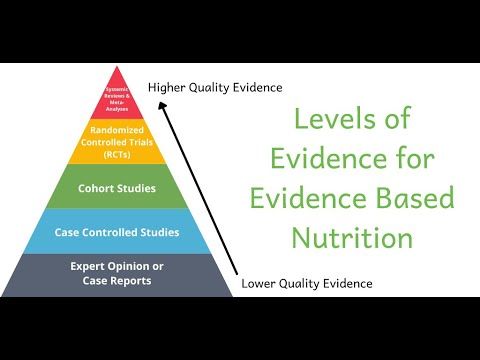In today’s digital age, where information is just a click away, we are constantly bombarded with conflicting advice about what we should or shouldn’t be eating. From fad diets to miracle supplements, it’s hard to separate fact from fiction. However, when it comes to nutrition, making evidence-based decisions is vital for our health and well-being.
What is Evidence-Based Nutrition?
Evidence-based nutrition is an approach that relies on scientific evidence to make informed decisions about what we consume. It involves looking at high-quality studies, clinical trials, and systematic reviews conducted by reputable researchers and institutions. By relying on robust evidence, we can navigate through the sea of conflicting information and make choices that are grounded in science.
The Importance of High-Quality Studies
Not all studies are created equal; therefore, it is crucial to focus on high-quality research when it comes to nutrition. Randomized controlled trials (RCTs) and meta-analyses are considered gold standards in research due to their rigorous methodologies. These studies involve large sample sizes, control groups, and double-blind methodologies, reducing biases and increasing the reliability of the findings.
When evaluating nutrition studies, it’s also important to consider the source. Peer-reviewed journals and research institutions are more reliable than individual testimonials or anecdotal evidence. The scientific community’s rigorous review process ensures that only well-conducted studies are published.
The Role of Consensus Statements
Consensus statements are valuable resources for evidence-based nutrition. These statements are issued by expert panels consisting of scientists, physicians, and researchers who have thoroughly reviewed the existing evidence on a specific topic. Consensus statements provide a clear and reliable summary of the current scientific understanding, making it easier for individuals to make informed decisions about their dietary choices.
Understanding Misleading Claims and Pseudoscience
In the tech niche, we often encounter misleading claims and pseudoscience around nutrition. It is important to be critical of these claims and separate the facts from marketing tactics. Companies may twist scientific studies to promote their products, making it challenging to separate what is valid from what is merely a money-making strategy.
One way to approach these claims is to look for multiple independent studies that support the same conclusions. A single study with sensationalized results should be approached with skepticism. Additionally, be wary of extreme claims or diets that promise miraculous results. Sustainable lifestyle changes, based on scientific evidence, are more likely to promote long-term health.
Consulting with Registered Dietitians or Nutritionists
When in doubt, seeking advice from registered dietitians or nutritionists is a recommended course of action. These professionals have the necessary knowledge and expertise to interpret scientific research and provide tailored dietary advice. They can help you sort through conflicting information and create a personalized nutrition plan that suits your individual needs.
The Bottom Line
Amidst the information overload of questionable dietary advice, practicing evidence-based nutrition is key. By relying on high-quality studies, consensus statements, and consulting with professionals, we can make well-informed choices about our nutrition. Remember, sorting through conflicting information can be daunting, but following the path of science ensures that our health remains a top priority.
